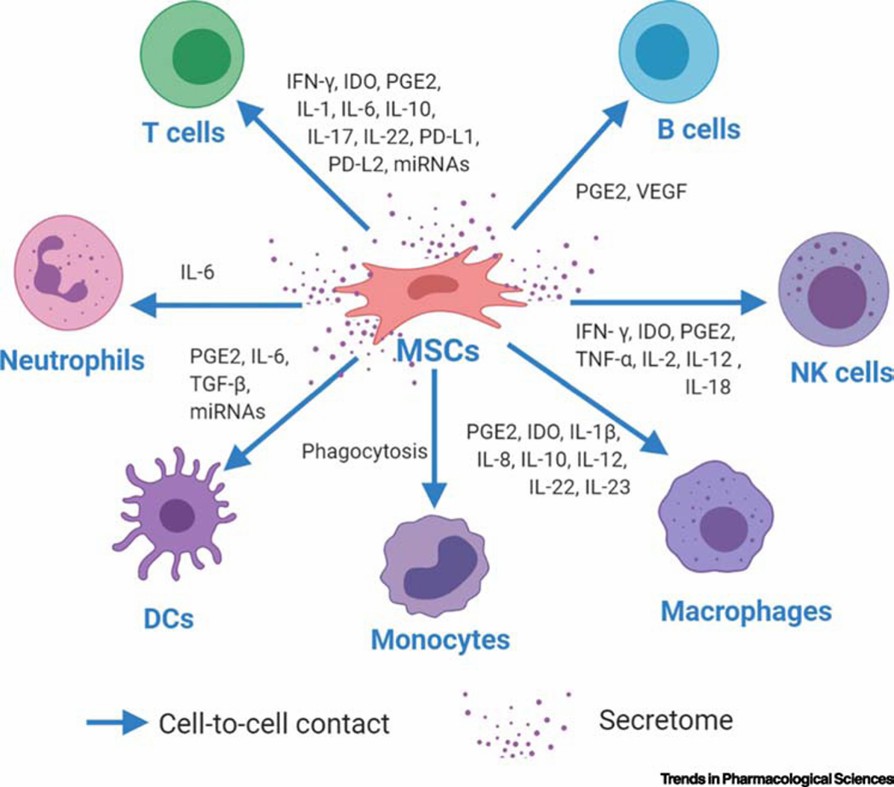Mesenchymal Stem Cell Growth Factors
Overview of Mesenchymal Stem Cell Growth Factors
Mesenchymal stem cell (MSC) growth factors are a class of molecular signals that can stimulate the growth and differentiation of mesenchymal stem cells (MSCs). Many MSC growth factors have been identified, and some common MSC growth factors include basic fibroblast growth factor (bFGF), tumor necrosis factor-α (TNF-α), interferon-gamma (IGG), interferon-γ (IFN-γ), epidermal growth factor (EGF), transforming growth factor-β (TGF-β), and platelet-derived growth factor (PDGF).
MSC growth factors usually affect MSC function by binding to specific cell surface receptors and triggering intracellular signaling pathways. These signaling pathways can regulate biological processes such as cell proliferation, differentiation, migration, and apoptosis. In addition, MSC growth factors can interact with extracellular matrix components to regulate MSC shape and function. In recent years, advances in biomaterials have also provided new ideas for the application of MSC growth factors. For example, MSC growth factors can be combined with bioscaffold materials to form composites and applied in tissue engineering and regenerative medicine to promote tissue repair and regeneration.
Types of Mesenchymal Stem Cell Growth Factors
Here are some common types of mesenchymal stem cell growth factors, for example:
- BMPs (Bone Morphogenetic Proteins)
- Epidermal Growth Factor (EGF) Ligands
- Fibroblast Growth Factor (FGF) Ligands
- TGF-β Family Ligands
- Vascular Endothelial Growth Factors (VEGFs)
- Growth Differentiation Factor (GDF)
- IGF Ligands
- Platelet-Derived Growth Factors (PDGFs)
- Wnt Ligands (Wnts)
This is only a small sample of mesenchymal stem cell growth factors, and there are actually many other types of factors that can play a role in MSC growth. The application and effect of each type of factor may vary depending on the purpose of the study and the specific conditions.
Research Areas of Mesenchymal Stem Cell Growth Factors
Mesenchymal stem cell growth factors affect and regulate the proliferation and differentiation of mesenchymal stem cells (MSCs), and regulate the biological properties of MSCs through a variety of mechanisms, which are important for human tissue regeneration, immunomodulation, inflammation suppression, and tumor development. The following are some of the major research areas of mesenchymal stem cell growth factors:
- Tissue regeneration and repair
MSC growth factors can promote the proliferation and regional differentiation of MSC into specific cell types (e.g., osteoblasts, chondrocytes, and adipocytes), thereby accelerating the repair of tissue injuries, such as the treatment of bone fractures, the repair of cartilage defects, and the treatment of skin wounds (Gresham RCH et al., 2020).
- Immunomodulation
MSC growth factor is able to inhibit or modulate the activity of immune cells, such as T-cells, B-cells, and natural killer cells (as shown in Figure 1), and reduce the release of inflammatory factors. This gives MSC growth factors potential applications in the treatment of immune-related diseases, such as autoimmune diseases, transplant rejection, and inflammatory diseases (Song N et al., 2020).
 Fig.1 Multi-faceted immunomodulatory interactions between MSCs and immune cells. (Song N, et al., 20220)
Fig.1 Multi-faceted immunomodulatory interactions between MSCs and immune cells. (Song N, et al., 20220)
- Inflammation suppression
Inflammation is a common feature of many diseases, and MSC growth factors exhibit an important role in inflammation suppression. They are able to inhibit the production of multiple inflammatory factors and regulate the balance of the inflammatory response. As a result, researchers are exploring the use of MSC growth factors to treat chronic inflammatory diseases such as rheumatoid arthritis and inflammatory bowel disease (Salari V et al., 2020).
- Tumor development
Some studies have shown that certain MSC growth factors may promote tumor cell proliferation, invasion, and metastasis. However, other studies have also shown that some MSC growth factors have the potential to inhibit tumor growth. Therefore, understanding the regulatory role of MSC growth factors on tumor development can help develop relevant therapeutic strategies (Cuiffo BG et al., 2012).
Notably, research in this field is still rapidly evolving, and new discoveries and applications are emerging. In-depth studies on the mechanisms of action and application prospects of MSC growth factors will contribute to our understanding of these growth factors and their potential roles in different diseases.
References:
- Gresham RCH, Bahney CS, Leach JK. Growth factor delivery using extracellular matrix-mimicking substrates for musculoskeletal tissue engineering and repair. Bioact Mater. 2020 Dec 24;6(7):1945-1956. doi: 10.1016/j.bioactmat.2020.12.012.
- Song N, Scholtemeijer M, Shah K. Mesenchymal Stem Cell Immunomodulation: Mechanisms and Therapeutic Potential. Trends Pharmacol Sci. 2020 Sep;41(9):653-664. doi: 10.1016/j.tips.2020.06.009.
- Salari V, Mengoni F, Del Gallo F, Bertini G, Fabene PF. The Anti-Inflammatory Properties of Mesenchymal Stem Cells in Epilepsy: Possible Treatments and Future Perspectives. Int J Mol Sci. 2020 Dec 18;21(24):9683. doi: 10.3390/ijms21249683.
- Cuiffo BG, Karnoub AE. Mesenchymal stem cells in tumor development: emerging roles and concepts. Cell Adh Migr. 2012 May-Jun;6(3):220-30. doi: 10.4161/cam.20875.


